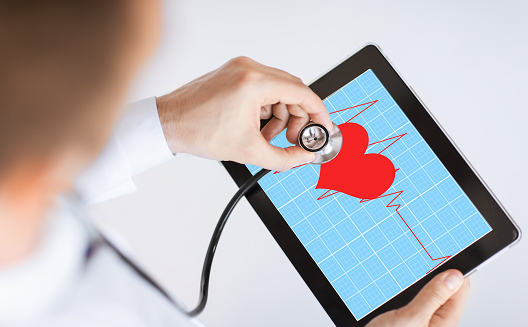Electronic medical services: health risks or new hope?


Checking your online pulse. (Image via Vanguard
Communications)
As the world commemorates World Cancer Day every February 4, cancer continues to be one of the leading causes of mortality with about eight million deaths attributed to cancer each year.
Saudi Arabia has allocated $29 billion to fund 11 new hospitals and 11 additional medical centers as research shows a significant change in common health problems in the region. Other countries in MENA are also increasing their healthcare appropriations.
New health challenges in the region
The increase in healthcare investment reflects the changes in public health challenges in MENA.
New issues, such as the inequitable distribution of advanced healthcare services and a rise in non-communicable diseases such as obesity and diabetes, are replacing the traditional healthcare problems of communicable diseases and high infant mortality rates these countries once faced.
Electronic medical services adapt to the changes
In response, several entrepreneurs in the region are tackling the digital healthcare sector.
Their services range from symptoms and diagnostic suggestions (Altibbi and WebTeb), to healthcare providers and booking services (Abidoc and Vezeeta).
Dubai’s Alem Health is bringing quality healthcare to patients in developing nations by linking them with doctors over an electronic communications and data transfer platform.
Does it work? How secure it is?
The increasing popularity of digital health services has raised questions regarding the accuracy of these services, especially the medical advice they provide. Most recently, after several studies indicated that some of these services might pose danger to its users, these questions have become more serious.
In mid-2015, a study by Harvard Medical School researchers tested 23 online symptom checkers and found them to be badly inaccurate. Furthermore, the Irish Medical Organization advised against remote consultations, diagnosis and treatment, saying they pose serious potential health risks.
“The body of a patient operates as one unit, its organs are not independent,” said Basma Mrad, a consultant in dermatology and laser surgery.
A patient cannot be diagnosed accurately at a distance, and relying on remote diagnosis created real risks to the health of the patient, she said.
Entrepreneurs in this field defend the services they provide.
Mussaad Al-Razouki (below) talking about obesity and healthcare issues. (Image via Nuwait)
 “Our services will never replace
personal visits to the doctor or the hands of surgeons, but there
are some simpler cases where a diagnostic can be made via a webcam
or a phone call,” said doctor Mussaad Al-Razouki, head of business
development at Kuwait Life Science KLSC and
cofounder of AbiDoc. “The future in these cases
is now.”
“Our services will never replace
personal visits to the doctor or the hands of surgeons, but there
are some simpler cases where a diagnostic can be made via a webcam
or a phone call,” said doctor Mussaad Al-Razouki, head of business
development at Kuwait Life Science KLSC and
cofounder of AbiDoc. “The future in these cases
is now.”
Al-Razouki believes modern services in the healthcare field provide three additional benefits: an increase in quality, easier access to medical services, and a decrease in the cost of healthcare. He also believes that the MENA region should concentrate more on quality and ease of access to medical services.
“Seventy percent of the population in GCC countries are obese, and 70 percent of them are younger than 35 years old. Also, 70 percent own smartphones; these three rates are the highest in the world in these categories,” he said.
The drive to incorporate electronic services in the healthcare sector should yield lower healthcare costs, said Altibbi managing partner Jalil Allabadi.
“Studies have shown that 70 percent of visits to the doctor are unnecessary, and often the patient is not examined,” he said.
Allabadi pointed out that his company provides general healthcare advice and medical information. Users should consult doctors for diagnosis and treatment.
The transfer of private medical data across platforms and devices raises patient privacy concerns.
“I think this matter is arguable in the long term but first, we must define the concept of breaching medical data. Revealing medical data in order to analyze them is not an invasion of privacy,” said Ahmed Al-Badr, a doctor who previously consulted for many medical insurance companies in the GCC area and cofounded the Saudi medical platform SihaTech.
He too insisted that electronic devices have become essential in providing medical services.
“I do not see any inapplicable usage, even in remote treatment,” he said. “What some people perceived to be fictional in the field of science is now a reality in certain hospitals, in some simple cases.”


